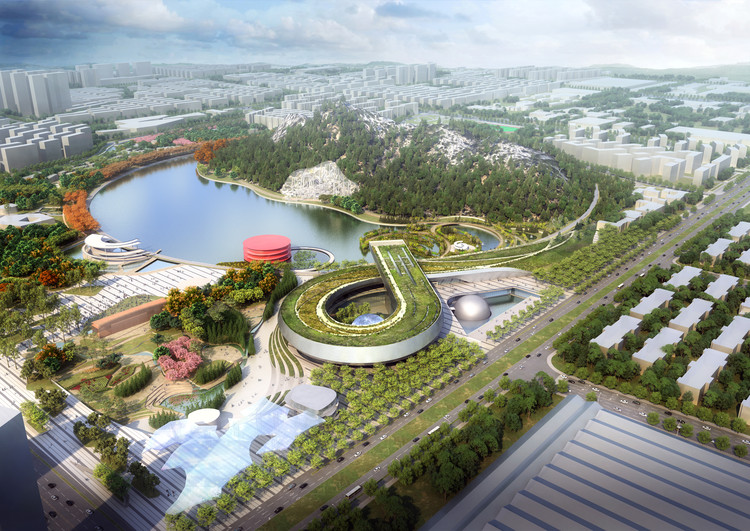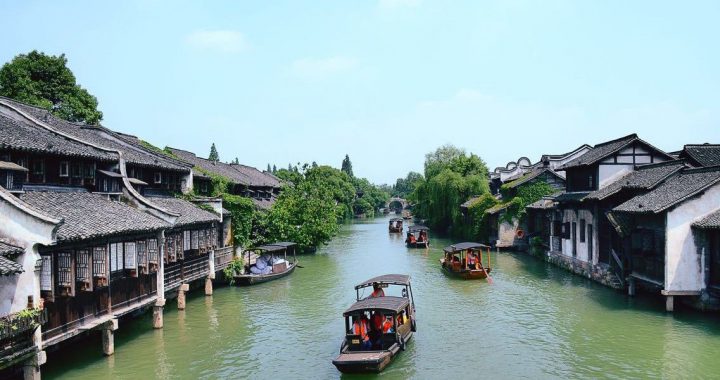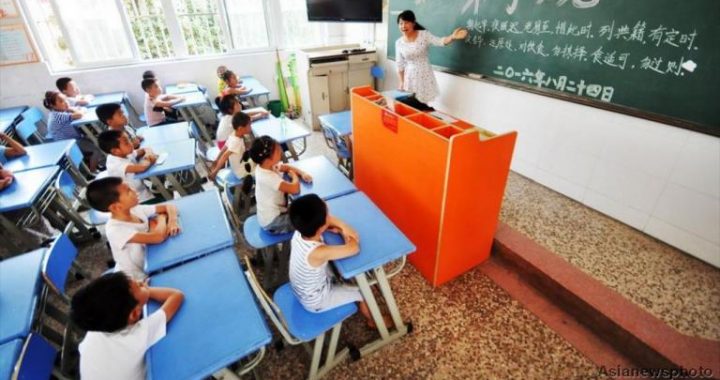The transition from culture to science and technology in Wuzhen, China
15 min readWalking down the town’s twisting stone alleyways, crossing the stone bridges, climbing an ancient pagoda or studying Confucian marital ceremonies, the visitor to Wuzhen most certainly enjoys a reflection of China’s past. However, Wuzhen is also very much connected to the present and the future.

This connection is not made by the modern architecture of its Mu Xin museum, the theatre or the conference hall alone. It is also made by involvement of Wuzhen in the virtual world.
The town is facing the virtual world in three ways. First, it hosts the annual World Internet Conference. Second, it stages exhibitions on virtual reality and the application of “VR technology’ within industries such as gaming, media and driverless cars using gadgets that will transfer thoughts into action. The third dimension of modern Wuzhen is as a platform for one of Chinas virtual hospital treatment scheme. These modern characteristics of Wuzhen are as important to the town’s governors as is the care of visitors who come to learn about Chinas past culture.
The first World Internet Conference was held in 2014 and focused, in a phrase coined by the Chinese, on ‘ cyber sovereignty’. Chinas rise in the last century reflected a massive transfer of economic power. Economic historians would claim China is simply reclaiming its dominant place amongst the world’s economies. In eighteen out of the last twenty centuries the value of China’s economy exceeded all others. However, it played little part in shaping trade and economic structure over the last 200 years. Through the developmentof its Belt and Road Initiative (a new Silk Road to the West) involving neighbouring countries to the West, its Asian Infrastructure Investment Bank (which challenges the US-dominated World Bank), The Shanghai Cooperation Organisation(an energy and security group) and the RCEP(equivalent to Trans-Pacific Partnership from which the USA withdrew), there is every likelihood that China will mould much of the traditional international economic structure in the twenty-first century. China is also trying to influence the world’s internet development.
China seeks to proclaim the right of each sovereign nation to develop, use and control the internet as it sees fit. They wish to present Wuzhen as the Virtual Davos’. This claim was thought contentious in the West. Most Western countries have consequently boycotted the conferences in Wuzhen. However, since the conference’s inception in 2014 the dangers of the internet have become ever more evident. Cyber hacking by terrorist groups, interference in nationalelections by rogue states, the spread of fake news, financial fraud, disruptionto financial systems, identity theft and online terrorist radicalisation have made international cooperation in policing of the internet ever more necessary.
There are many issues to discuss; in one example the internet’s non-political luminaries, including its inventor, the Englishman Sir Tim Berners-Lee, declared their belief that encryption codes should not be released to security services.
Sovereign states tend to disagree. Such issues could profitably be discussed in a place like Wuzhen.
Instead of a multi-national approach to encryption codes a single senior British politician in 2017 summoned the technical leaders of Google, Microsoft, Twitter and Facebook to a summit in London to discuss this issue. On his own it is unlikely the politician will have made any progress on this isue. It would surely be more effectively discussed together with their Chinese twins Baidu, Alibaba and Tencent during the Wuzhen Internet Conference. Nor do the negatives about the internet concern crime and illegal behaviour exclusively.
Other aspects cry out for discussion. Its psychological impact on people, children particularly, is increasingly observed. Online clips of a baby swiping in frustration at the pages of a magazine ‘ went viral’; the clip’s byline was a magazine is an iPad that doesn’t work’. An individual’s IQ might sometimes be stimulated online but the equally important EQ assuredly is not. Online addicts are less able to read emotions in others. The internet disconnects people from each other. China now has four hundred clinics treating internet addiction.
These are problems shared by every country. They need to be discussed and Wuzhen provides as good a forum as any other.
It does not now seem so clever for Western countries to have kept away from Wuzhen. Attendance need not have meant acceptance of whatever cyber policies China sees fit to implement domestically, any more than a presence at Davos indicates acceptance of the xenophobia which periodically bursts forth from Switzerland.
Reflecting the importance attached to the event within China,a senior state leader has attended each conference. President Xi himself took part in 2015— indeed it is reported that China’s top internet policy committee is one of the only four committees which the president chairs.A vast conference centre, with halls, reception and exhibition areas, has been built to accommodate delegates. It was designed by the Chinese architect Wang Shu. Wang is a native of Hangzhou. He won the world’s top architectural accolade, the Pritzker Prize, in 2012. Wuzhen evidently has the power and the money to attract the very best. Aspects of its style,a rooftop garden and rectangular form, remind of Le Corbusier at his best but the style of the conference hall acknowledges local architecture as well. The sides of the buildings are covered with the blue tiles common in Zhejiang province. They protrude from the hall’s side walls asif they represent individual small roofs and so are young cousins of the Qing buildings in town. Modern Wuzhen embracing history is the obvious message sent out from the building. The message can be easily read.
At the 2016 conference the main item discussed was artificial intelligence.
To the amusement of many one machine launched a minor assault upon a delegate during the conference. However, there are immensely important issues around this development to discuss. Stephen Hawking, Steve Wozniak, Bill Gates and other luminaries of science and technology discussed the dangers of the internet. There were forums on’ internet entrepreneurs,”big data, the rule of law in cyberspace’,’ internet smart healthcare,’ internet culture’. Doubtless fake news will be on the agenda of future conferences. Wuzhen will be a platform for such discussions.
In another debate China’s head of cyberspace addressed the concerns of the international community over the country’s new cyberspace law which essentially would have obliged foreign firms operating in China to keep data in China. Those firms feared for their commercial security. China argued it sought to improve online security. The best approach for Western countries is to argue their case through attending the conference. There were other topical debates.
There is little logic to the West’s demand that China yield the right toself-determination over internet matters. Western countries have accepted that countries have sovereignty over internal matters since the 1648 Treaty of Westphalia established the nation-state in international law. The expectation on foreign internet companies to do business in China under local rules, rather than those in force in their home countries, is not so unreasonable.
Engagement is surely preferable to a boycott. It is for Chinals government to assess whether such restrictions are counter-productive within China, be it generating resentment amongst its citizens, smothering initiative and harming its image in the world beyond China. If China’s cyberspace laws keep away the Western titans of the virtual world, its own powers of innovation are likly to atrophy. However, issues like artificial intelligence, encryption codes, the damage of addiction and the evil which the internet can spawn make a most powerful argument in favour of continued international dialogue at Wuzhen. It is difficult to understand why the logic of the Westphalian argument cannot be applied to the internet.
History teaches that the biggest dangers result from a refusal to engage.
England’s own policy of ‘ Splendid Isolation’ and disengagement from Europe inthe late nineteenth century is generally considered to have had bad outcomes.
Neither periodic isolation in China, nor American isolationism in the 1930s brought any benefit to these countries. Indeed they brought negative effects, just as the threatened Trump-led American withdrawal from international engagement would have done. The first lesson given during courses on how to influence through negotiation is to engage with the other parties. The West’s boycott of Wuzhen does not seem very clever.
The motives or wisdom behind the instigation some years ago of these controls in China may be challenged. Their growing relevance in when the world has understood the sustenance which the internet can provide to evil might just provide another good reason for Western politicians to engage with China in Wuzhen. China has so often chosen a different route to the West.
The Asian ideal of meritocracy in contrast to Western democracy, isolation over international engagement, invasive state control against greater personalfreedom, the place of the extended family balanced against the Western nuclear family are but a few examples. Whatever the past and present differences, disengagement at the instigation of the West over such an important part ofmodern life as the internet does not seem wise. In an era when many in every country feel distanced from the elite the internet has become an antidote to alienation. It is a conduit for news, provides social contact, creates political pressure and sustains communication as a modern version of the eighteenth-century English coffee houses.
Chinas internet was launched twenty-one years ago in 1996. Of Chinas 1.4billion population, there are now around 700 million users, and dot-cn ranks second after dot-com as the most used domain name suffix. The growth potential is huge which is why, even if the Western politicians stay away for the moment, the Western business people do not. Western countries may still not send political representatives but their technical leaders show less reluctance. In 2016the CEOs of Facebook and LinkedIn as well as senior vice-presidents of Amazon came to Wuzhen. Apple and Microsoft sent senior representatives. Theorganisers claimed attendance by 310 technology corporations, amongst them Microsoft, IBM and the German software company SA. Jack Ma of Alibaba and Pony Ma of Tencent, two mega stars of the Chinese internet world also play highly visible roles in the forum. Google’s lobbying in Wuzhen perhaps prepared the way for the unblocking of their services which is expected in the near future; perhaps only its academic sector will be tolerated at first but news, information and politics may follow.
The attractions of access to China’s markets are sufficient to overwhelm any compunction from international business leaders over the internet’s political issues. These corporations do have practical concerns however. After the 2015 Cyber Security Law was passed by the Standing Committee of China’s top legislature forty-six global business groups composed a joint appeal to Premier Li Keqiang urging revisions. This at least represented engagement and through argument might achieve change. Western politicians should engage as well, not least in order to explain that building a sophisticated economy in China during the internet age with a heayy censorship regime in place will be difficult.
The extent to which the internet is reaching far down in everyone’s lives is emphasised by various service platforms, some of which are hosted from Wuzhen. The most important platform hosted there concerns health. Healthcare in Wuzhen has become a practical example of internet technology application,E-Health’ has become an ‘ outgrowth of the digital revolution’, to use currentjargon. Though a physical presence is rather a contradiction in terims, Wuzhen does actually host an Internet Hospital. There are always residual matters which demand a direct human input and on the ground floor of the hospital’s administrative centre smartly dressed bi-lingual staff explain the concept of internet-driven healthcare to press and visitors.A’ We Doctor’ app can be downloaded onto a smart phone. It is Chinas largest online registration system through which bookings can be made and medical treatment received. The We Doctor Group is collaborating with the Tongxiang local government to provide this service through its Guahao website. The platform allows a consultationwith an accredited doctor and where appropriate prescribed medicine can be delivered to the patient’s home. It can also facilitate visits to hospitals.
Such use of the internet has particular relevance in China due to the country’s huge east-west imbalance. Amongst the many inequalities along this axis is that of medical care. The Wuzhen Internet Hospital is trying to address the uneven distribution of medical resources. Seventy per cent of existing medical resources are based in cities, yet there are still hundreds of millions living in rural communities. Wuzhen’s internet medical support is a much-needed opportunity to deal with this problem. With the ageing profile of Chinas population, the demands on its health system will increase significantly.

After registration there is an online medical consultation and if medicine is offered it will be delivered directly to the patient’s home. Alibaba presently manages the We Doctor online pharmacy platform. Alibaba has also started an online medical and health provider known as Alihealth. Doctors have generally welcomed the change. The internet medical service enables doctors to reach far more patients than when based in a single doctor’s practice. These professionalswill therefore be able to earn more. China’s doctors have traditionally not been well paid,a situation unscrupulous companies such as GlaxoSmithKline(GSK) were able to exploit through corrupt payments until their exposure in 2014.
There are a number of competing smart healthcare providers.
Chunyuyisheng. com is one of the largest mobile medical service providers; it is five years old and has 92 million users supported by 410,000 doctors.
Another is Dingxiangyuan, or dxy. cn, which is supported by Tencent. Each provides consultations, medicine delivery and a hospital liaison service. These platforms are mostly concerned with ‘ Western’ chemical-based medicine but Traditional Chinese Medicine is now involved in virtually arranged delivery as well. After five years Wuzhen’s health service platform alone comprises almost 200,000 doctors in twenty-seven of the thirty Chinese provinces and regions. Itis making an important contribution: for the five years since its inception 270 million consultancies have been given. Nonetheless in terms of Chinas national health system the service is still in its infancy.
England is somewhat behind in virtual health matters. It shares with China the equally pressing issues of limited capacity and growing demand from an ageing population. The British National Health System (NHS) has issued reports proclaiming ‘ Virtual Wards’ as a worthwhile means of reducing admissions. Acute care, it argued, can be delivered at home and time spent resident in hospital reduced. It embraced in theory this new type of ‘ CarePathway’, but by 2014 the National Health Association(NHA) had only created 379 virtual beds across twenty-one of the 145 NHS trusts. In those twenty-one trusts, the 379 virtual beds have saved 130,000 bed nights;15,000 people had been treated. China is ahead of England on this issue. It is again the sort of issue that could be gainfully discussed in Wuzhen. Meanwhile the NHS discussion document highlights the need to move slowly and the need to deal with cultural expectation that the hospital is the traditional setting for acute care. The NHS might be able to move more quickly if it could learn from the experience of China.
The arguments in favour of virtual healthcare are clear. Capacity of skilled staff and beds is expanded, patient well-being can be enhanced through recovery at home, and costs can be reduced. In a country the size of China with isolated rural areas it could yet provide a vital service. However, internet services seemto neglect all rural folk, be they a short distance from London or from Beijing. Since the fifty per cent of China’s population left unconnected to the internet are mostly to be found in rural areas, technical improvement must be made before the internet-based health platform can be effective.
As the internet is perforce strengthening, the power of Chinas people to be heard by their government, so those neglected in rural China may also benefit in a number of ways from the internet. Such benefits, together with the wonderful ability of the net to make so much knowledge accessible, need to be remembered amidst all its negative consequences. China is certainly ahead in net-delivered medical services, although the wishes of health service experts to proceed slowly and carefully must be respected. Trust is at the essence of all medical matters. Any misjudged expansion of such a new means of delivering medical care could be deeply damaged.
Health is certainly the most important internet platform but it is not theonly demonstration of the internet’s reach which Wuzhen provides. It claims some vast number of internet hotspots. There are twenty-six bike rental stations where payment can be triggered by a scanned code. Internet kiosks, essentially housing a large flat screen, can transfer information to any hand-held device.
Older people who may be day patients in Wuzhen’s Homes for the Elderly are also linked through the internet. Locations can be tracked, family members notified and medicines administered in the homes through a link to the main Wuzhen internet health platform. Those running Wuzhen tourism are trying hard to surf the internet wave. Identity cards are required in China for most forms of travel as they are to stay in hotels and do many other things, even to enter the Wuzhen tourist area. However, face recognition technology is now being trialled as an entry mechanism to replace cards.
Wuzhen is also becoming the chosen backdrop for hi-tech companies launching their latest gizmo. Companies realise that Wuzhen not only triggers the thought of’ beautiful water town’ in customers’ minds, but also conjures images of cutting-edge computer technology. In 2017 Hikvision, an international digital technology company based in Hangzhou, chose Wuzhen to launch its automated car parking system. Using robotics to reduce car parking stress and solving car parking problems may not rank alongside the significance of the internet health platform but it is potentially a huge market. Hikvision is a large business, in which the state is the majority shareholder, and focuses primarily on labour-saving robotic devices. There is a certain symmetry about mechanical aids which address the problems of a declining workforce and a health platform which supports the increasing number of old people.
There are three giants in the Chinese internet world. Jack Ma, who founded Alibaba in 1995 as a trading platform, Robin Li, who founded the search engine Baidu, and finally Pony Ma, the founder of Tencent. Tencent controls WeChat, the ubiquitous mobile chat facility, and the web portal QQ. Each attends theWuzhen conference. Alibaba is involved in Virtual Wuzhen through Alihealth.
In 2016 Baidu, like Hikvision, has chosen to trial its self-driving technology in Wuzhen. In the same year Tencent’s chairman Pony Ma addressed the Third World Internet Conference in Wuzhen.
The Chinese trio, with state support, has checked the progress of the American competitors to world internet domination. Google offers a global library, Facebook the global networking site and Uber the world’s transportation network. Helped by low-cost manufacture in Asia, these American businesses, along with Youlube, iPhone, Twitter, Snapchat, dominate everywhere in the West. Indeed these American businesses have made the internet. It benefits in return through massive corporate income and influence from wherever this dominance has been achieved. China alone has retained its independence.
The Chinese trio referred to as BAT-Baidu, Alibaba and Tencent-have through clever innovation kept the American companies away. China’s business growth, its internet success and the increasingly obvious dangers of the net should have convinced Western governments to follow its independent businesses and join in the debates at Wuzhen.
Chinas history is full of stories of chaos as if there were some invisible centrifugal force impelling the country towards disintegration. Periods in between the strong long-lasting dynasties are littered with names which suggest disorder: the Warring States Period, the Sixteen Kingdoms, the Five Dynasties, the Ten Kingdoms. These were each the disastrous outcomes of weakness. Feeblegovernment by the Qing led to shaming events inflicted by Western countries during the nineteenth century. Opium and occupation of Chinese territory by many European countries were two such humiliating outcomes. These traumas are on top of the minds of many twenty-first-century Chinese and certainly of those in power.
In understanding China, the relevance of this past must be understood.
At a poetry conference in Shandong in 2016, the opening request by a Chinese poet to a visiting Englishman was for his opinion on the OpiumWars. Collective historical memory in China is very strong. Knowledge of ancient and recent history explains so much about the Chinese approach to government. Included in those areas is the internet. The question of whetherit was sensible for the West to react with disengagement from Wuzhen is no longer relevant. In this new era, given the dangerous problems now associated with the internet, engagement at the Wuzhen Internet Conference is essential.
Global internet governance and cooperation over its controls and uses is vital.
Western politicians, and not just its businessmen, should be there to help set the parameters of the debate. Lecturing the Chinese from the outside about their internet policies will achieve absolutely nothing. Far better to engage in theWuzhen Internet Conference and discuss how to ameliorate the negative aspects of the internet.









